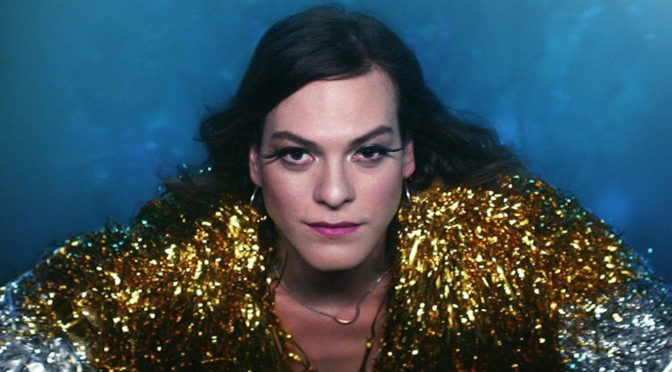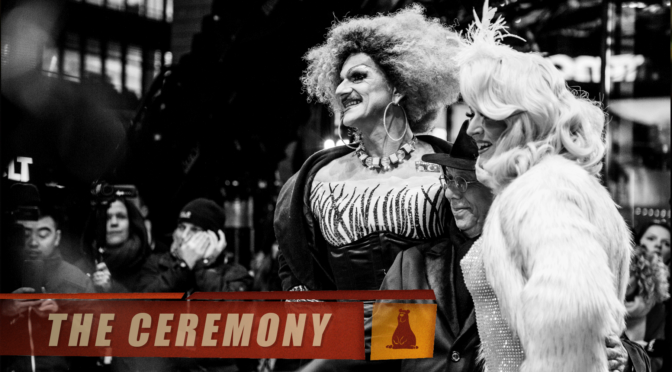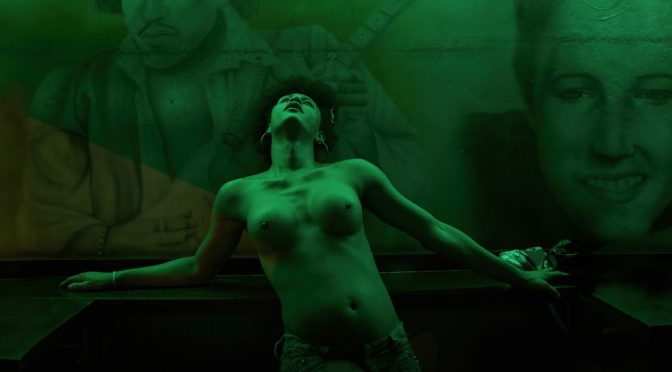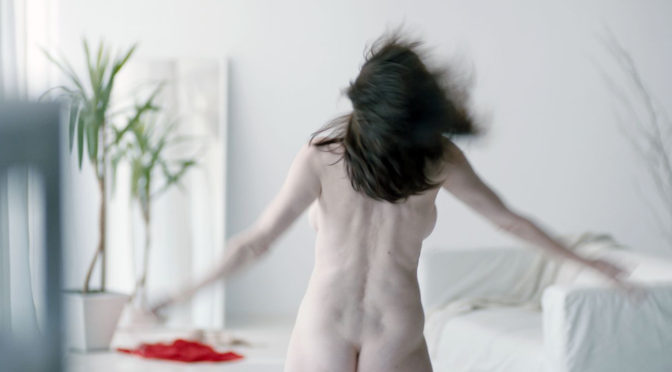During the celebration of the 90th Academy Award last Sunday, ‘Una Mujer Fantástica’ (‘A Fantastic Woman’), was awarded the Oscar for Best Foreign Language Film. The film, which won the 31st TEDDY AWARD for best feature in 2017, is the work of Chilean director Sebastián Lelio. The Academy Award for a non-English speaking film has been given away since 1956 and ‘A Fantastic Woman’ is a landmark recipient in a number of respects; it’s the first first Chilean film to win the foreign-language Oscar, the first film with a trans themed plot to take home the prize, and lead actor Daniela Vega is the first openly transgender person to present an award on stage at the ceremony. Sebastián Lelio praised Daniela Vega as “the inspiration for this movie”. 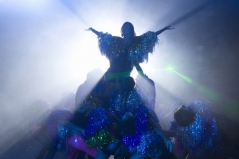 The story follows Marina (Daniela Vega), a transgender woman working as a waitress, who has a loving relationship with Orlando (Francisco Reyes), a divorced man 30 years her senior. Their affectionate love is brought to an abrupt end on the day of Orlando’s sudden death. In the aftermath of this tragedy, Marina is faced with the hatred of Orlando’s ex-wife and children. She fights simultaneously for her right to mourn her beloved one and against the prejudices and harassment from her late lover’s family. The film not only gives a sensitive portrayal of the universal right to grieve but also tells the intimate story of a trans women in today’s conservative Chile. On a broader level, the film highlights the transphobia and ignorance constituting every-day life for many transgender people around the world. Few would be able to leave the cinema unmoved by this touching story of love and loss. To learn more about the film, have a look at our interview with director Sebastián Lelio and lead actors Daniela Vega and FranciscoReyes: https://www.youtube.com/watch?v=Q9VQLBKaP9Q
The story follows Marina (Daniela Vega), a transgender woman working as a waitress, who has a loving relationship with Orlando (Francisco Reyes), a divorced man 30 years her senior. Their affectionate love is brought to an abrupt end on the day of Orlando’s sudden death. In the aftermath of this tragedy, Marina is faced with the hatred of Orlando’s ex-wife and children. She fights simultaneously for her right to mourn her beloved one and against the prejudices and harassment from her late lover’s family. The film not only gives a sensitive portrayal of the universal right to grieve but also tells the intimate story of a trans women in today’s conservative Chile. On a broader level, the film highlights the transphobia and ignorance constituting every-day life for many transgender people around the world. Few would be able to leave the cinema unmoved by this touching story of love and loss. To learn more about the film, have a look at our interview with director Sebastián Lelio and lead actors Daniela Vega and FranciscoReyes: https://www.youtube.com/watch?v=Q9VQLBKaP9Q
Tag Archives: 68. Berlinale
TEDDY AWARD CEREMONY 2018
For those unlucky few who weren’t able to join us for the famously fabulous TEDDY AWARD ceremony, you can see the entire ceremony here! Highlights include Wieland Speck’s annual speech, Sate Minister Markus’ Prabst defiant proclamation against homophobia, Jack Woodhead’s upside-down piano-playing, and Linn de Quebrada’s stunning stage performance.
All here for you to watch again and again…
TEDDY TODAY: Friday 23rd February
It’s the day you’ve all been waiting for – THE TEDDY AWARD CEREMONY IS HERE!!!! As a warm-up to tonight’s proceedings, why not catchup on some of the lovely selection of films listed below, before glittering-up and joining us for a night of celebrations at the Haus der Berliner Festspiele.
See you on the dance floor!
Don’t Worry, He Won’t Get Far on Foot
Director: Gus Van Sant
USA 2018 113′, English
Zoo Palast 1, 12:30
Evidentiary Bodies
Director: Barbara Hammer
USA 2018, 10′, Without dialogue
Akademie der Künste, 18:00
Garbage
Director: Q
India 2018 105′, Hindi
Cubix7, 20:15
Hojoom (Invasion)
Director: Shahram Mokri
Iran 2017 102′, Farsi
Cubix 7, 22:30
Ludwig der Zweite, König von Bayern (Ludwig II of Bavaria)
Director: Wilhelm Dieterle
Germany 1930, 132′, German intertitles
Zeughauskino, 21:30
Obscuro Barroco
Director: Evangelia Kranioti
France/Greece 2018 60′, Portuguese
Zoo Palast 2, 16:00
Para Aduma (Red Cow)
Director: Tsivia Barkai Yacov
Israel 2018 90′, Hebrew
CinemaxX 3. 13:30
Shakedown
Director: Leilah Weinraub
USA 2018 82′, English
CineStar 7, 14:30
T.R.A.P
Director: Manque La Banca
Argentina 2018 16′, Spanish
CinemaxX 3, 21:30
Touch Me Not
Romania/Germany/Czech Republic/Bulgaria/
France 2018
Director: Adina Pintilie 125′, English, German
Friedrichstadt-Palast, 12:00
Tuzdan kaide (The Pillar of Salt)
Director: Burak Çevik
Turkey 2018 70′, Turkish
CinemaxX 4, 22:00
TEDDY TODAY: Thursday 22nd February
My oh my how time is flying – we’ve hit Thursday and are drawing near the final weekend of the Berlinale. But fear not, there’s still more premiers to catch, plus HEAPS of films to catch up on so stay tuned!
Today’s films, separated by over 80 years, look at mental health and the physical body. In both ‘Ludwig der Zweite’ and ‘Touch Me Not’, the confusions of the mind and body are analysed. Where Ludwig falls victim to psychological disarray in the first film, in the latter we see a more positive working through of the human psychology. A sign of the times, perhaps?
Ludwig der Zweite, König von Bayern (Ludwig II of Bavaria)
Director: Wilhelm Dieterle
Germany, 1930, 132′, German intertitles
Screening: 19.00, CinemaxX 8
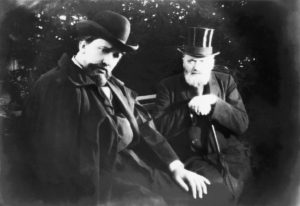
In the last years of his life, Bavarian king Ludwig II (1845 – 1886) devotes himself to ambitious architectural projects, which strain the state coffers to the extreme. The monarch, who is afraid of people, also withdraws more and more into a dream world at his various castles. His brother is already in a psychiatric institute and Ludwig is also eventually put under the care of psychiatrist Bernhard von Gudden. The king attempted to get out from under this guardianship at Starnberg lake … “If the upper echelons don’t like you, you must go …” Taking a down to earth point of view, this story of the “fairy tale king” depicts the descent of a broken character into mental breakdown. In Wilhelm Dieterle’s interpretation, fawning courtiers and officials, the heir apparent, and the medical profession all contributed to hastening the collapse. So the dispassionate film, which did not hide Ludwig’s fascination with the naked male body, drew intense criticism from Bavaria. When Berlin’s censorship board refused to intervene, Munich’s police commissioner imposed a ban on showing it on the grounds that it was “a danger to the public order.”
Touch Me Not
Director: Adina Pintilie
Romania/Germany/Czech Republic/Bulgaria/France, 2018, 125′, English, German
Screening: 22.00, Berlinale Palast

Laura cannot bear to be touched and recoils whenever anyone catches hold of her or takes her hand. She goes to see a therapist,
and orders a male prostitute, but her body is still like an armour. In a loose succession of scenes, we follow other people in search
of intimacy. Christian, who has to live with many physical impairments, talks candidly about what turns him on, what turns him off and his love life with his long-standing girlfriend. The couple participate in a workshop on body awareness attended by people of all ages, with and without disabilities, such as Tudor. His bald head makes him seem strangely vulnerable and he has yet to discover and accept the manifold forms of his desire. The cool images and laboratory-like atmosphere of this film help the viewer to jettison their own preconceived opinions and ideas of intimacy, as it takes us on an emotional expedition to illuminate the many different facets of sexuality beyond all taboos. Each scene develops its own sense of truthfulness, regardless of whether the situations have been staged or present documentary footage.
TEDDY TODAY: Thursday 15th February
Hello and welcome to the 32nd TEDDY AWARDS! We’ve got a feast of cinematic treats in store for you over the coming 10 days. From TEDDY veterans like Barbara Hammer and Gus Van Sant, to first-time directors from all over the world, the 2018 films bring the diversity and innovation that characterise the award. Look out for the prominent themes of body politics, intersectionality and the celebration of sensuality, to name just a few.
In our TEDDY TODAY posts we’ll be taking you by the hand through the queer world of the Berlinale, keeping you up to date with what to watch, when and where. Kicking things off is the Panorama opener, ‘River’s Edge’. This stunning feature from Japanese director Isao Yukisada begins, fittingly, with a shot of a girl clutching her childhood teddy bear. The scene is a flash forward towards which the rest of the sprawling narrative flows, winding it’s way through the lives of a group of teenagers. Prepare yourselves for bold, unflinching depictions of the sexual and psychological secrets that torment the younger generations of today…
River’s Edge
Director: Isao Yukisada
Japan 2018 118′, Japanese
CinemaxX 7, 21:00
Tokyo, 1994. In a video interview a young woman discusses the significance of a teddy bear. Shortly afterwards, a burning object falls from a high-rise building at night. A young man, naked and bound, falls out of a locker. Two fisherman talk about a water spirit. In his unusual drama River’s Edge Isao Yukisada lays many trails and jumps as abruptly and unpredictably between the various narrative threads as do his characters: Ichiro is gay; he is preyed upon by his violent fellow pupils but seems to draw strength from his injuries. He makes a gruesome discovery at a nearby river polluted by industrial waste and shows it to his best friend, a girl named Haruna. Kannonzaki loves rough sex and in the course of it transgresses more and more boundaries. An introverted girl obsessively reads her pregnant sister’s diaries and Kozue, a model with bulimia, buries herself in mountains of food at night. All these and other stories are brilliantly interwoven into a breathless social portrait of a driven but apparently lost generation and their seemingly unavoidable encounters with violence.
